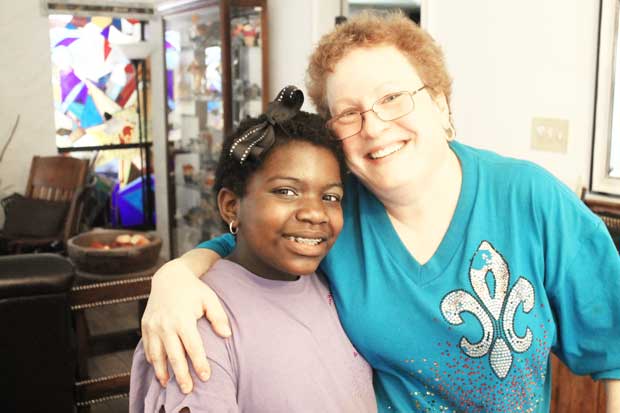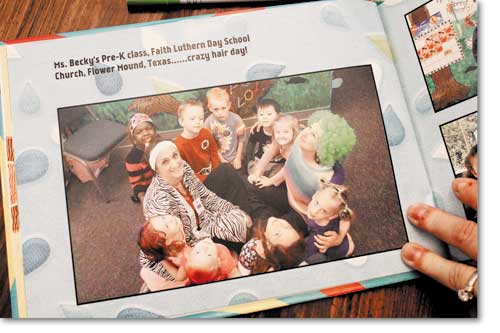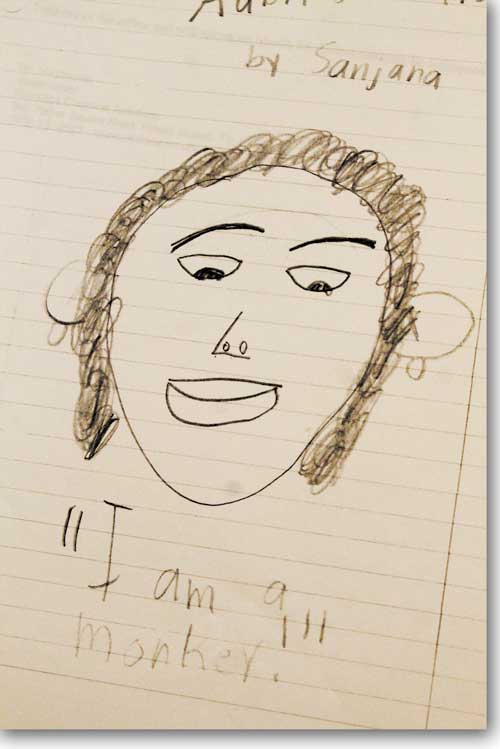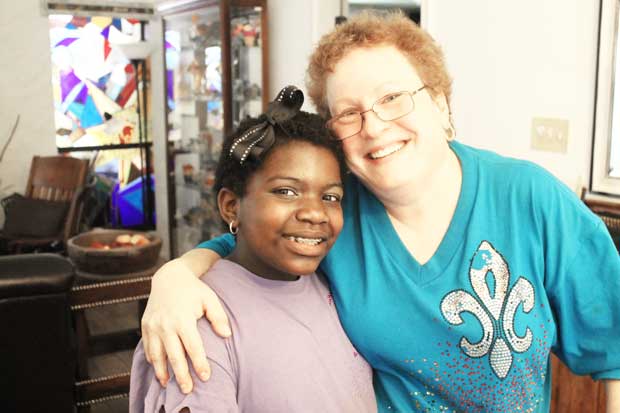Lesbian moms expected their child to have every educational opportunity available — not the blatant racial discrimination
they find themselves fighting

A picture of Aubri’s pre-K class shows her excluded from the circle, below. Audri with her mom Susan, above and, bottom, the ‘I am a monkey’ drawing.
DAVID TAFFET | Senior Staff Writer
How does a parent react when her African-American child’s been discriminated against in school?
Do you have “the talk” with your child to learn how to get along in white America? Or do you find other ways to ensure your child gets the best education available and has every opportunity this country has to offer?
Susan Kirschner was horrified when her daughter Aubri came home from Founders Classical Academy of Flower Mound with a drawing of her one of her classmates gave her, with the caption “I am a monkey” written beneath it. She was more horrified when she contacted Aubri’s teacher, who told her she had seen the picture and didn’t see anything wrong with it.
After exchanging emails and phone calls about the situation, school officials told Kirschner if she set foot on the school campus again, they would call police.
As lesbians, Kirschner and her partner, Emily McDonald, understand discrimination. But Kirschner’s father was a Holocaust survivor. From the time she was a child she was taught: “Never again.” Silence was not an acceptable response to injustice.
But that didn’t prepare the couple for what happened to Aubri, who is black.
The family
Eight years ago, Kirschner and McDonald arranged a private adoption.
“The birth mom picked us,” Kirschner said proudly.
They met the birth mom after sending her pictures of their home and bios that included the information that both women were nurses. After meeting, the birth mom handed her baby to them and said, “This is your daughter.”
“I was breathless,” Kirschner said when she first held Aubri. “We were in total awe.”
Kirschner described her daughter as smart, beautiful, funny, creative and insightful. And Aubri’s skin color never crossed her moms’ minds.
Not until she went to school.
That’s when the discrimination began. In pre-school.
Kirschner likes to make memory books for Aubri that include photos and artwork. She made one with pictures from her pre-K class at Faith Lutheran Day School in Flower Mound. The two moms loved one particular picture of Aubri wearing a crown. All they saw was their beautiful daughter looking like a princess.
It took four-year-old Aubri to point out the obvious.
“Why did you include that picture?” she asked her moms. She told them she hated the photo because in it, the teachers and other children are sitting in a circle, but Aubri is outside the circle.
 That’s Aubri’s first memory of being excluded.
That’s Aubri’s first memory of being excluded.“Kindergarten was no joy either,” Kirschner said. When the children would line up to make a train, “my daughter was always the caboose.”
So for first grade, Kirschner home-schooled her daughter. But Aubri kept saying, “Mommy, I want to go to school.”
She wanted friends. So they started looking for a school.
They found plenty of religious schools around Flower Mound, all of which told them “our family wasn’t welcome,” Kirschner said. So they enrolled Aubri in Founders Classical Academy, a charter school owned by Lewisville-based ResponsiveEd.
In its two-paragraph “Respect for all” policy, ResponsiveEd notes: “Students must not engage in harassing behaviors motivated by ethnicity, gender, color, religion, national origin, or disability directed toward another student.” But the 61-page Parent/Student Handbook includes no anti-bullying policy.
During the last school year, Kirschner kept in touch with Aubri’s teacher through emails and letters, always trying to keep things positive, despite a less-than-welcoming classroom atmosphere. Even when she was writing to address an incident that might have been motivated by racial bigotry, Kirschner began with a positive comment.
Throughout the first half of the school year, mother and teacher tried working things out amiably — until the incident with the monkey picture.
The two moms have a file about two inches thick holding all their correspondence with the school. It includes a note Kirschner wrote to the teacher in November: “Today, Aubri came home crying trying to express that another classmate … is taunting/mocking and irritating Aubri, when teachers are engaged with other tasks.”
She told the teacher Aubri was rattled and frightened by the other student.
Then in October, Aubri was instructed to stay away from another child after that child made a derogatory comment about her mom. Aubri was disciplined, it seemed, for another child’s bullying. In December, Kirschner wrote to Aubri’s teacher “that [a student] made a physical attempt to spit, yes spit, into Aubri’s lunch yesterday.”
In January, Kirschner wrote the teacher about something Aubri picked up during a lesson on slavery. Aubri told her mom that she learned that if the Civil War hadn’t occurred and Lincoln hadn’t ended slavery, she wouldn’t be their daughter, but would be their slave.
“We were shocked,” Kirschner wrote. “What do you say to that?”
Kirschner said she could only kiss her daughter and tell her how much she loved her no matter what had happened.
In that same letter, Kirschner also responded to the teacher’s question in an earlier note, telling the teacher it was fine to send home more challenging math problems for Aubri to work on. Despite her treatment in the school, Aubri was a straight-A student.
 Reaction
ReactionApril Silliman is an educational advocate with the law firm Cirkiel and Associates who’s been working with Kirschner and McDonald. In addition to unaddressed discrimination by the school, Silliman’s concerns include “unwarranted removal of parental rights” and “retaliation for speaking out” about bullying that’s apparently based on skin color.
Silliman said the Flower Mound campus is the charter school company’s crown jewel and she’s learned, in working with another parent of a minority student, they try to “keep certain people away.” The tactics are subtle. For example, while the uniform is the same at all of the Founders Classical Academies, it costs more for students on the Flower Mound campus.
The company maintains no counselors at the school and told Silliman teachers can do the counseling. But most teachers have no counseling degrees and are unequipped to do the work that a licensed counselor does, Silliman noted.
When Dallas Voice contacted the school for a response to the allegations and the woman who had cheerily answered the phone heard the name
Aubri McDonald, her tone quickly changed. She snapped, “You’ll have to call our corporate office.”
Mike Terry is communication director for ResponsiveEd in the Lewisville main office. He did not return Dallas Voice’s calls seeking comment.
Buster Spiller and his husband are black parents who raised three children. Spiller said black children are disciplined in school at a higher rate and that school officials often ignore bullying against black students. He said Kirschner and McDonald may not have been fully aware of how black children in public education are treated.
But as gay parents, Spiller said, “Our inner pit bull comes out.”
Cd Kirven explained how black parents teach their children eacly how to handle discrimination and bullying. She recalled the first time she was called the “N” word. She said it happened when she was trying to buy ice cream.
“This is how to handle it in the future,” she said her mother explained. “I’m here to help you get through the pain.”
She described those “talks about how to survive being black in America” as “normal, everyday conversations black parents have with black children.”
Although they never had “the talk” with Aubri, Kirschner and McDonald didn’t sit still as the discrimination through the year got worse and worse. They realized conferences, letters and emails to the teacher and principal wouldn’t be enough.
The “monkey” picture was the turning point. In a letter to her mothers, the principal accused Aubri of writing “I am a monkey” on the picture herself, even though it’s clearly not her handwriting. And in one exchange, the assistant principal of the school admitted he was raised in a racist home.
And when the school’s only reaction to the rising animosity was to ban Kirschner from the school, she contacted her state senator and her Congressman for help.
State Sen. Jane Nelson, R-Flower Mound, a former teacher and currently the highest ranking Republican in the Texas Senate, was alarmed enough by the correspondence she was sent that she contacted the Texas Education Agency on the family’s behalf. That agency told Nelson that cases like this are handled by the Office of Civil Rights within the U.S. Department of Education.
U.S. Rep. Michael Burgess, R-Flower Mound, helped the family file a complaint with the Office of Civil Rights. This week, they were informed the case had been accepted and the Department of Education will be investigating the school.
This fall, Aubri will be attending a different school. Over the summer, she’s been going to camp and going boating and playing with other children.
But how’s she doing in general?
“My daughter is sad,” Kirschner said.
………………………..
Students safer at schools with GSAs
According to a new study from Vanderbilt University, LGBT students
feel safer at schools with gay-straight alliances.
The researchers found that students who attended a school with a GSA were:
• 52 percent less likely to hear homophobic remarks
• 36 percent less likely to be fearful for their personal safety
• 30 percent less likely to experience homophobic victimization.
“Society makes it very hard to be a queer youth,” said researcher Robert Marx.
“I think it’s reallyimportant to understand the healing and transformative
power of being a part of a supportive community.”
Students who are subjected to homophobic victimization are at risk for
substance abuse, depression, poor academic performance and suicidal
thoughts or actions. Having a place for students to talk and receive
support from straight and LGBTQ peers can go a long way in
reducing those risks, the researchers said.
………………………..
Unfair discipline pushes LGBT students out of school
According to a new study by the Gay Lesbian Straight Education Network, LGBT students face an unfair amount of discipline, including detention, suspension and expulsion from school, often after having to endure harassment or bullying.
The report found:
• Two in five LGBT students reported receiving detention, in-school or out-of-school suspension and/or expulsion from school. LGBT black, Hispanic, multiracial, homeless, or disabled students experienced higher rates than others.
• Among LGBT students, the most common reason cited for not planning to graduate high school or being unsure if they would graduate was an unsupportive or hostile school environment.
• Bullying, harassment and absenteeism may contribute to high rates of discipline of LGBT students, potentially because bullying incidents put LGBT students in greater contact with school authorities. Lack of safety resulted in many LGBT students missing school, putting them at risk for disciplinary sanctions for truancy.
• Anti-LGBT discriminatory policies and practices may also contribute to high rates of discipline of LGBT students; 56 percent of LGBT students experienced some form of anti-LGBT discrimination at school, and these students were more likely to have received school discipline than those who did not experience discrimination.
• 9 percent reported being disciplined specifically because they were LGBT.
• Victimization, absenteeism and discrimination may also increase LGBT students’ risk of contact with the justice system. LGBT students who reported high levels of victimization, absenteeism or discrimination were more likely to have been involved with the justice system as a result of school discipline.
• The likelihood of this involvement was five times higher for LGBT students experiencing homelessness than for those who lived with a parent or guardian.
This article appeared in the Dallas Voice print edition July 29, 2016.















